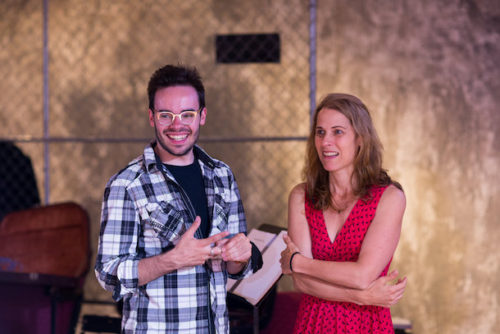
©Annabel Clark
Like so much of America, Hammond began following the story art collective Pussy Riot after their it slammed onto our social media feeds in February of 2012. That month, five young women entered Moscow’s Church of Christ the Savior, covered their faces in bright balaclavas, and yarled a punk prayer—“Virgin Mary, put Putin away!” The action was short—guards dragged them out after less than one minute—but the resulting media firestorm was long. After Pussy Riot uploaded a video of the event to YouTube the girls were charged with “inciting religious hatred,” tried and sent to labor camps for two years.
To tell their story, Hammond flooded herself with research material—she read exhaustively, attended protests at the Russian Embassy in New York, traveled to Moscow. The resulting piece, woven from real text and rich with music and audience participation (though not of an arbitrary, invasive variety), views the Pussy Riot story from many angles: the women themselves, the Western media that fixated on them, an orthodox Church employee, a Russian political prisoner without the advantage of Western media attention.
The play premiered at the Contemporary American Theater Festival at Shepard University in 2015, where it was a commissioned work. Hammond and Ellis met the following year at San Francisco’s Magic Theatre, and she mentioned she’d written a sort-of-musical about Pussy Riot. “When [Theatre Battery] read the play all together, what stood out was how it’s reaching out about international, socio-political events that might feel alien to our audience, but that because of current events in our country are going to feel extremely prescient.”
“This play and this company are a great fit because Pussy Riot was an anonymous art collective, and Theatre Battery is a loose collective of like-minded people with a collective voice,” Hammond says. “Pussy Riot was adamant that no admission was charged to any of their events, and Theatre Battery has radical hospitality.”
Radical Hospitality, a concept pioneered by Mixed Blood Theatre in Minneapolis, is about eliminating barriers to entry. “Nobody who is not a traditional theatergoer has any reason to believe that 25 dollars or even 10 dollars is a good deal on a play,” Ellis says. “When you have no context, stepping into a storefront theatre with a play that you’ve never heard of is actually a big risk for people and a good reason to not want to do it.” And so, Theatre Battery tickets are free.
“It allows people to get away from the expectation that you’re purchasing a piece of entertainment, and more into the idea that you’re tapping into a community resource,” he says. “Just like a library or a church, everyone is welcome to this, and walking in isn’t going to cost you anything.”
Read the full article from City Arts here.